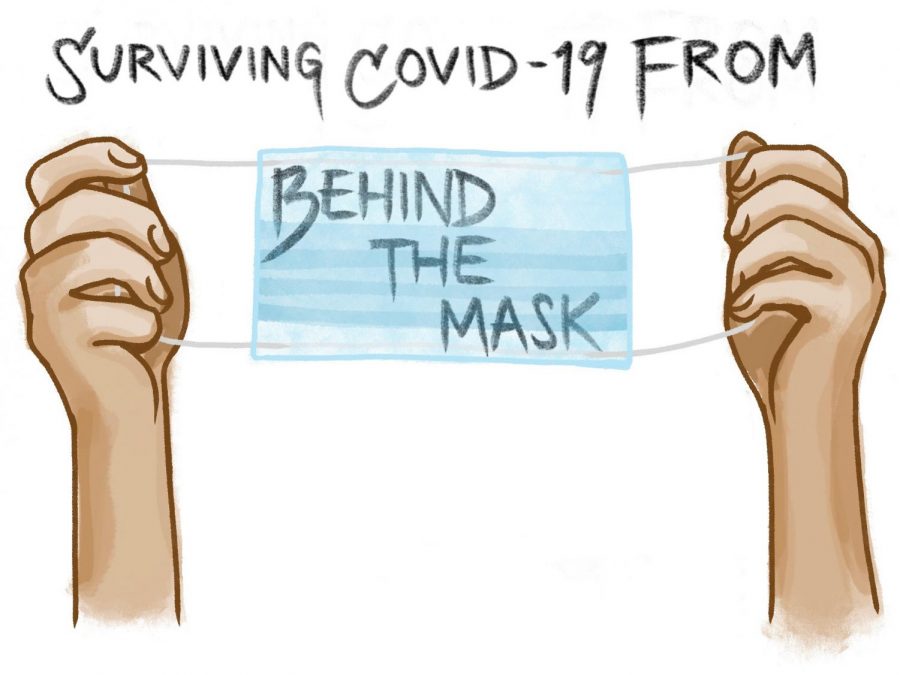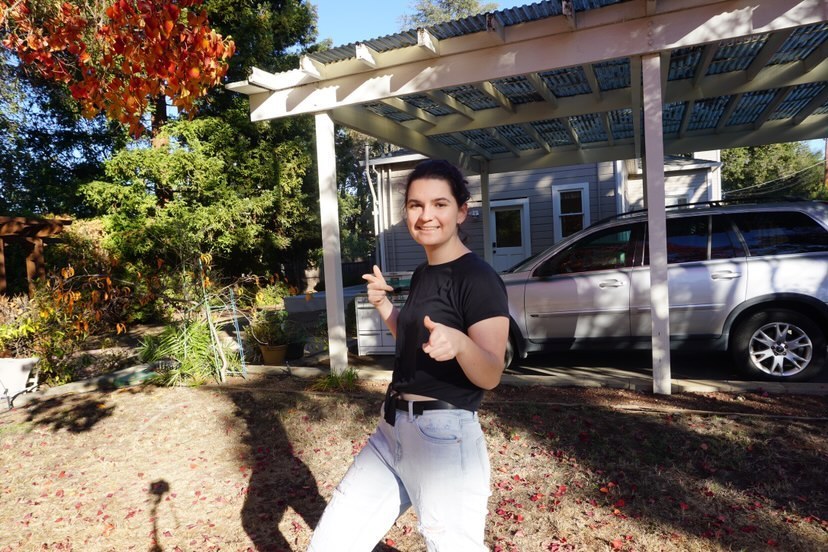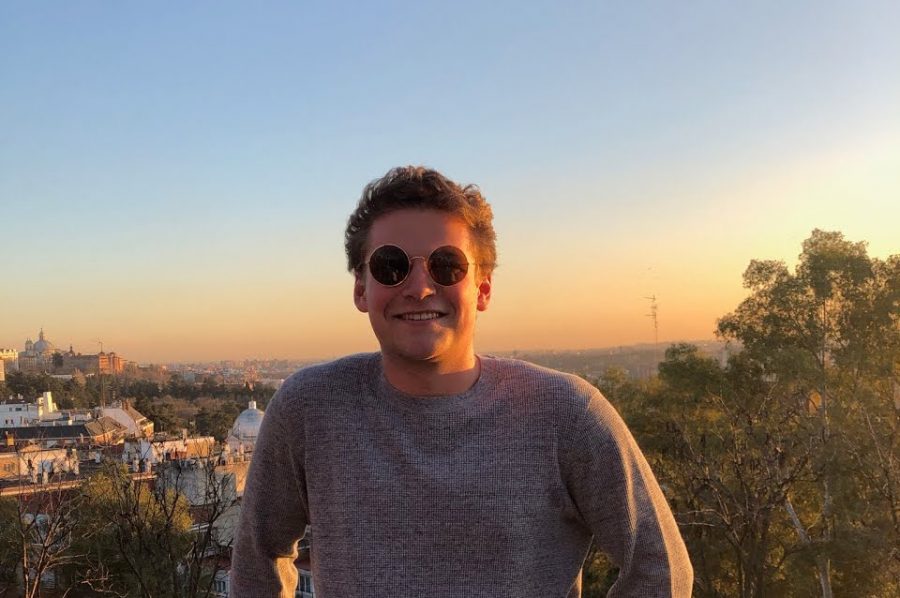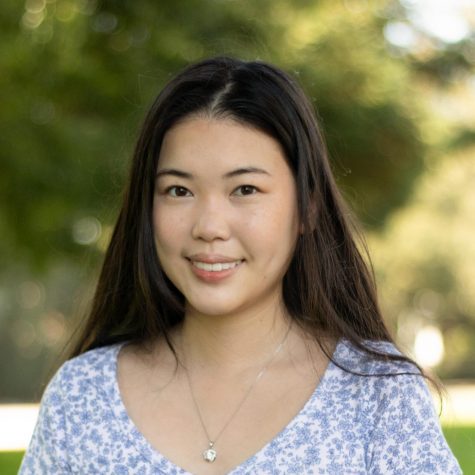Over the last year, COVID-19 has infected millions of people across the world including fellow community members here in Los Altos. Ranging in the severity of their symptoms and age, some of those diagnosed shed light on their experience with the virus.
Surviving COVID-19 from behind the mask
January 6, 2021
As the pandemic rages on, The Talon shares the stories of local COVID-19 survivors in this ongoing spread.
Lauren Haragan
Senior Lauren Haragan contracted COVID-19 in July 2020 while working at a local grocery store. After tackling viral symptoms like the loss of her sense of smell and taste, she’s returned to work, now dealing with store customers who refuse to adhere to safety guidelines.
The grocery store Lauren Haragan works at chose to remain anonymous.
While clocking in for her shift at the grocery store one July morning, senior Lauren Haragan learned from her employers that her coworker had tested positive for COVID-19. Feeling congested on her ride home, Lauren feared her possible exposure.
“I was like, ‘I could have COVID-19, I could also have a cold,’” Lauren said. “Then I started losing my sense of taste and smell, and I thought, ‘This might not be too good.’”
Until she got tested, Lauren kept hoping that her symptoms were not COVID-related, but five days later, it was confirmed: She had contracted the virus. Lauren later learned that several other coworkers caught the virus as well, and the store temporarily shut down due to the spread.
Lauren immediately quarantined herself for ten days. In the small apartment on the second floor of her home, she drew, binged the entire Harry Potter series and finished online Health class.
Fortunately, however, her symptoms — congestion, cough, sore throat, body aches and a low-grade fever — only lasted four to five days and felt no different from the symptoms of a typical winter cold. The worst of Lauren’s experience was the loss of two vital senses, taste and smell, which prevented her from determining the specific flavors of her food beyond whether it was “sweet, salty or sour.” Lauren remained terrified by this sudden change until her senses returned unaltered three weeks later.
“I was worried because some people lose their sense of smell and taste permanently,” Lauren said. “My parents told me not to do any more research because it was freaking me out.”
Beyond the symptoms of the virus, Lauren also faced a renewed sense of loneliness in quarantine. Being an only child, Lauren was used to spending her free time at home independently, but she missed seeing her friends, some of whom were initially wary of her after her diagnosis.
“I was talking to my friend and I said, ‘We should hang out,’” Lauren recalled. “She said, ‘My dad said I’m not allowed to hang out with you because you had COVID-19.’”
Her daunting experience with COVID-19, however, had a silver lining. Before the virus, Lauren didn’t really have a sense of community at her job. After all the employees returned, though, they bonded over their shared experiences, inquiring into who had contracted the virus and empathizing with one another.
“When we came back, it was like, ‘Oh, did you have COVID-19? Did she?’” Lauren said. “Now I definitely have more friends there.”
Despite getting the chance to grow closer with her coworkers, experiencing the virus first-hand has also made part of her job description a frustrating struggle. Like many workers throughout the pandemic, she’s had to convince her fair share of reluctant grocery shoppers to adhere to COVID-19 safety guidelines.
“At work, I have to tell people to wear masks, and they’re like, ‘Masks don’t do anything,’ or I have to sanitize people before they go into the store, and they’re like, ‘I don’t want that on my hands,’” Lauren said. “I’m thinking, ‘The whole world is not about you. We could’ve been done 30 seconds ago if you would just sanitize your hands.’”
Lauren added that some of her coworkers didn’t believe masks were necessary anymore since they had already gotten COVID-19 and that the chances of contracting it again were low. She, however, disagrees and has become even stricter about wearing masks and washing her hands before she eats.
“The reason I got COVID-19 was that my coworkers and I would go upstairs and sit in the indoor break room without circulated air and masks,” Lauren said. “Looking back, that was really, really stupid. Long story short, wear a mask.”
While studying abroad in Madrid, LAHS graduate Lucas Popp, ’17, did not anticipate a worldwide pandemic, let alone contracting COVID-19. Despite having relatively mild symptoms, Popp remained wary of infecting his family members, dealing with misinformation during his recovery.
Lucas Popp
Los Altos High School graduate Lucas Popp, ‘17, contracted COVID-19 in early March, before most people in the country knew just how deadly the pandemic would be.
Popp — a computer science major with an affinity for hiking and camping — spent the second semester of his junior year studying abroad at University Carlos III of Madrid at the start of the pandemic. When President Trump announced a travel ban on Europe, his family quickly arranged a flight home for him. Popp was already experiencing a runny nose, a cough and other symptoms of a common cold.
When he arrived, his mother took him straight to the hospital from the airport to get tested, where they waited at the ER for three hours. After his test, Popp quarantined in his room to wait for the results.
“It was very difficult for me not to hug him when I first saw him at the airport,” his mother Nancy Popp said. “This was scary, but I was so grateful they tested him as quickly as possible. As a mother, I did not get much sleep that week.”
The next day, the test results came back. But they were misinterpreted, and the family assumed Popp tested negative. A day later, however, Popp received an unexpected call from Stanford University, asking him to participate in a study observing people with COVID-19.
According to his sister junior Stephanie Popp, it was a nerve-wracking realization because her brother, while under the impression he was COVID-free, had hugged and cooked for them. Antibody tests later indicated that Popp was the only family member to contract the virus.
“I had known people were getting sick, but I didn’t really know what it was like,’” Stephanie said. “Lucas didn’t have it very bad, but it was still very stressful hearing about all the articles and information that was coming out.”
Popp continued to live with his family, quarantining in his room for the three weeks he had the virus. During dinner, he sat at one end of the table while his family sat at the other end. He was allowed out of his room, but he had to wear a mask and could not touch anything except for designated chairs.
According to Popp, his symptoms were relatively mild, mainly consisting of a runny nose and a cough, but toward the end of the infection, Popp felt weak and tired for several days. Then, his sense of smell was severely reduced for two months — an experience Popp said he didn’t mind because he could still smell things if he really tried — without experiencing any other apparent long-lasting effects.
“I think it gave me a false sense of confidence in the beginning because I got it and I [thought]: ‘I can totally handle it, [it’s true] that it doesn’t really affect young people,’” Popp said. “Now there’s lots of information coming out that says [the opposite].”
Though Popp’s symptoms were milder than others, the reactions of those around them were not. Stephanie explained how people were afraid of their family for a while after Popp contracted the virus; for example, her birthday passed while her brother had COVID-19, and her friends just dropped off gifts across the street.
After recovering, Popp stayed home through the summer. He has now returned to Case Western Reserve University in Cleveland, Ohio, to complete his degree. The college is now requiring random sample testing of students and faculty as well as remote classes to protect their students from the virus.





